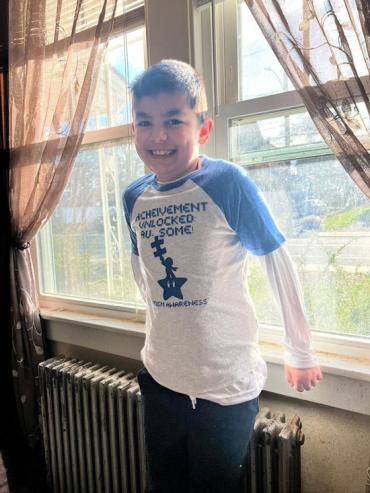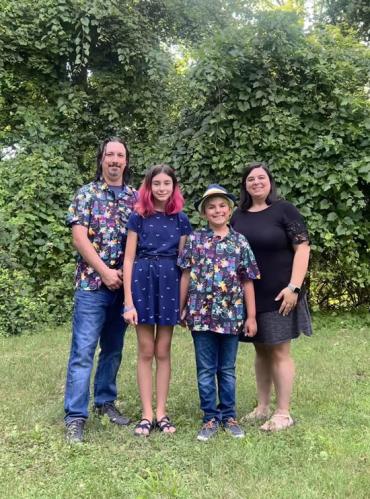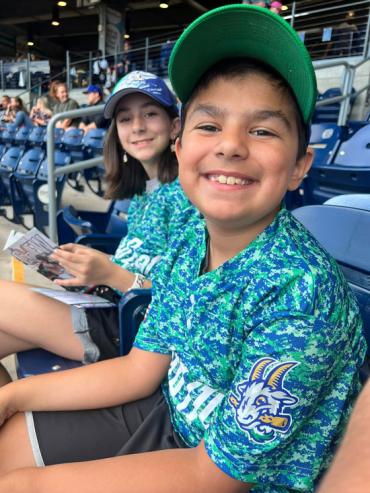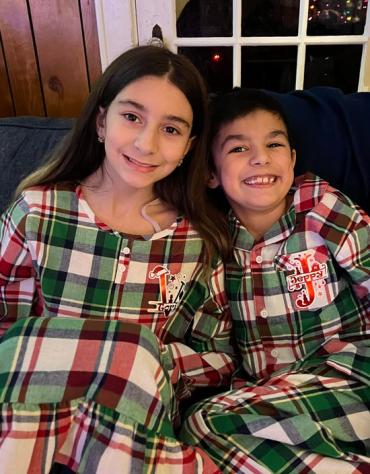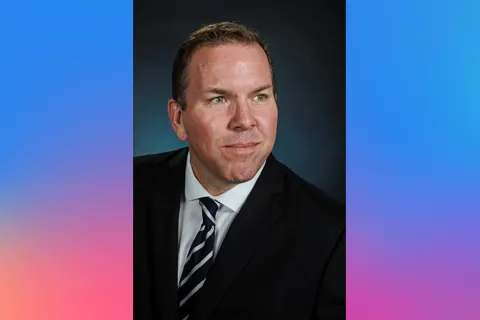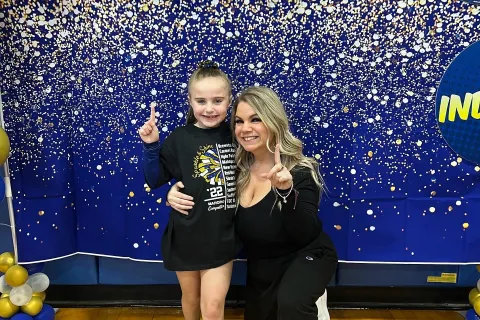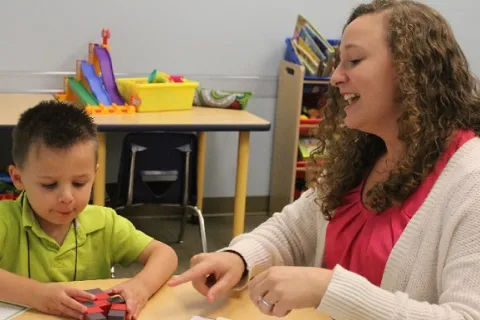Meet Jeffrey W.
Jeffrey W., 10
To our family, it means embracing the amazing, celebrating the small wins and understanding the struggles.
Hi, I’m Stephanie, and I’m proud to talk about my 10-year-old son, Jeffrey, during Disability Pride Month. My son is amazing because he’s accomplished so much since being diagnosed with autism at 18 months. While it might not be Little League or Boy Scouts or the more “traditional” childhood achievements, they’re big accomplishments nonetheless because of how hard he’s worked along the way.
As a mom, all I want is for my children to be happy, confident and accomplished in whatever they choose to do. I know it's going to be harder for Jeffrey to find a voice in this world because of some of the struggles he faces. Until then, I will speak for him, I will make sure his needs are met and that he is pushed hard to achieve his goals. I will not allow anyone to sway me from that course of action because his fight is my fight, and his voice is my voice, until such time he can stand up and advocate for himself.
I know that Disability Pride Month means something different to everybody, but to me, it isn't about celebrating the fact that you have a child or family member with autism. To our family, it means embracing the amazing, celebrating the small wins and understanding the struggles. I am so incredibly proud of Jeffrey, and I am so incredibly proud of his sister, Victoria, and the rest of our family for learning to be advocates for people with disabilities.
Learn more about Jeffrey and his family’s journey in this Q&A with his mom, Stephanie:
In your experience, how important are early intervention services?
They’re essential. Intervention services afforded my family time to adjust to therapies, services, learning what treatments Jeffrey responded to, how he preferred to learn, and what potential challenges school would present. In Connecticut, there are services called "Birth to Three" which allowed us to immediately have a team of therapists working with Jeffrey, but also working with and educating my family.
Please describe some of the therapies and services that Jeffrey receives. How have those services positively impacted his life?
Jeffrey gets speech therapy, occupational therapy, social-emotional therapy, applied behavior analysis (ABA therapy) and special education. These therapies are designed to assist Jeffrey in his growth, allow him to advocate for himself and help him to interact with his friends and classmates. What is remarkable is how much these therapies end up teaching his dad and I about what he responds to.
Speech therapy has given Jeffrey the ability to really let us into his world. I think of the times I've asked him to "use your words," and he pauses, thinks about what he wants to say, and is able to articulate more clearly. I think it's important to remember that this isn't perfection, and we'll continue to work on gains and improvement. But we are in a place where we can have several interchange conversations, something I never thought I'd have with him.
Occupational therapy has given Jeffrey independence, which is a very powerful word. Think about all the little things you may take for granted in your day to day, such as being able to dress yourself, make your own meals, tie your shoes, all of the general activities of daily living that are habitual for many people. The independence continues to grow, but today, Jeffrey not only can dress himself, tie his shoes, make his simple lunch and pack his snacks for school, but he also knows other general motor skills, such as how to type with two hands, how to hold a pencil or crayon properly, and what he needs from a sensory experience.
Social-emotional therapy has been a major game changer for Jeffrey. He's worked so hard to understand the social situations a child would be placed in. Again, these are many things that people take for granted: how to read a room, or when it's okay to yell out an answer versus raising your hand. He's always been a wonderfully positive and pleasant child to be around, he's always smiling and winning people over with his bubbly personality, but now he's able to play games with friends, take turns appropriately, understand when it's okay to stop and say hello, and has learned safety measures regarding talking to strangers.
ABA therapy has been in his life since he was 18 months old. Currently, we have an ABA therapist assist in the classroom, as we had a short instance with somewhat aggressive behavior and we wanted to understand the cause and teach Jeffrey the consequences as a result. In short, we experienced this in kindergarten, and have not had that level of aggression since. However, we keep the ABA therapist involved as part of his team because we still get great insights, suggestions and alternative approaches to therapy that maybe we hadn't considered.
Did you realize something was different about Jeffrey before their diagnosis? If so, please share some of your experiences and how the diagnosis came about.
My husband and I had our daughter, Victoria, before we had Jeffrey, and some of the milestone achievements that we expected seemed delayed. In fact, we appeared to have had a setback in some instances as well. When you take your child to well visits, there's a milestone questionnaire that parents fill out. That was the easiest way to see that there were delays starting to make themselves more prevalent.
I really recommend all parents to be honest with their physician. It's not necessarily going to lead to any diagnosis, but it will lead to education, assistance and a more honest conversation about what you can do to help your child progress. These are not report cards on you as a parent!
What were your initial thoughts when you first received your son’s diagnosis?
My initial thoughts are not my current thoughts. I'll admit I was devastated at first, which I'm not proud of today, but you cannot help a gut reaction. When you are raising a child, you get a preconceived notion of who that child will grow up to be, and getting a diagnosis of autism immediately changed that notion. I did cry and I did have a moment of denial, which quickly morphed into feeling completely overwhelmed. The overwhelmed feeling was because from the moment of getting the diagnosis, the testing agency immediately set up services, put together a team of therapists, and scheduled meetings to help us cope with the news, and get intervention started immediately. There was no down time at all, and it was clear that time was of the essence and Jeffrey's autism diagnosis was just as important to them as it was to me. That overwhelmed feeling fades rather quickly, and I cannot stress this enough, it has gotten easier as each year passes.
Tell us about some of the struggles he has faced/faces as a result of his autism?
Socially, Jeffrey has some weaknesses. He struggles with thinking about an action or words before saying or doing them. Each of the therapies I've mentioned have helped tremendously, but there's still work to be done. For example, we could be out at a sporting event as a family, and Jeffrey will hear a conversation held by someone near us. He'll interject and insert himself into that conversation, even if it's not appropriate. This is where the expected versus unexpected behavior comes into play.
How has he learned to communicate and how has that improved since his initial diagnosis?
When Jeffrey was first diagnosed, his most common answer to any question (aside from “what's for dinner”) was "I don't know." How was school? Why are you sad today? Did anything fun happen? All questions were met with "I don't know." It's a frustrating experience because, as a parent, you want to know what made them smile that day, what they didn’t like, if they are unhappy.
We started with teaching him the basic emotions—happy, sad, angry. If he could at least tell me the feeling he had and identify that same feeling in others, we would praise his accomplishments. We then layered in more complexity, more acute feelings, more distinguishing “what happened after that” questions. We also were taught the right way to ask the questions. That's important too—it's not just about what Jeffrey will learn to respond to, it's just as important to communicate with him in a way that he understands how to respond appropriately.
What are some of Jeffrey’s biggest strengths?
Academically, he is remarkable. He loves math and has always been above grade level when working on the subject. He is so enthusiastic about life as well. The smiles are genuine, full of life and truly light up every room he's in. Jeffrey loves to learn about things such as outer space. Being an astronaut is his career goal, and knows everything there is to know about Super Mario.
What advice would you give to other parents who have a child/children on the spectrum?
It gets easier. There's so much in that small statement, but that's the truth. You get more comfortable with the terminology, with talking about goals, expectations and desires. Until then, ask for help, research the Autism Speaks resources tab, hire an advocate. These are all things I did. These are all things, even with my knowledge and confidence, that I still do to this day.
You don't need to shoulder any of this alone—there are resources and a community of people here to help, even if it's just for a shoulder to cry on. One of my biggest confidants is the mother of a child who also has an autistic son the same age as my son. The support system often extends beyond the immediate family and once you learn to embrace it, you realize how much easier things become.
Another thing that I was hesitant at first with, and learned my lesson quickly, was to include your child's siblings in the conversations, the therapy and the action planning. My daughter Victoria is about 18 months older than Jeffrey, and she is a huge help with teaching valuable life skills. He watches her learn them and wants to be just like her. Further, I am raising the future of disability advocacy in her, and that is unquestionably as important as making sure Jeffrey is successful.
What is your connection to Autism Speaks and how have we provided support to you and your family?
When we first started Birth to Three, we started talking about therapies and who would test Jeffrey. We found the group we used, Creative Interventions, through the Autism Speaks website. When we moved from preschool to kindergarten, the classroom was not a great fit for Jeffrey, and I knew I didn't have the knowledge yet to face the school district alone. Using Autism Speaks, we were able to hire an advocate who joined us in our IEP meetings and really helped drive our future success. Currently, we are yearly Autism Speaks’ Walk attendees, and I am constantly reviewing updated articles, reading other's stories and keeping myself educated in the new regulations and laws in support of people with disabilities. Autism Speaks is a thorough and comprehensive place to really stay informed and included. It's made a world of difference in my education.
What are your hopes for Jeffrey’s future?
With every wish Jeffrey makes—the wish has been to become an astronaut. I pray for that with all my heart because that means he has achieved complete independence. But more than that, I wish and hope for him to lead a fulfilling life. If that means finding love and starting a family, then I hope for that. If it means having a successful career, then I hope for that. We'll continue to work on his independence so that these futures might become a reality. In the meantime, I am happy living in the moment with all his gains.

